A recent study has found that women’s health concerns are often blamed on emotion, stress, age, hormones and even their imagination. This gender bias and ‘medical gaslighting’ is leading to delayed and missed diagnosis for women across Ireland. Orlagh Sharkey, Senior Associate in our Medical Negligence department looks at the negative impact of gender bias on medical patients who are her clients.
Thousands Surveyed On Women’s Health
A survey conducted among thousands of Irish women found that many women feel they are not being listened to by medical professionals. They feel they are not taken seriously when they speak to GP’s or hospital consultants about a range of health issues including sexual and reproductive health. They also feel their concerns and pain can be dismissed or minimised.
Findings Reveal Gender Bias in Healthcare
These survey results are in line with findings of gender bias in medical diagnosis in a number of international studies. Gender bias reduces the speed, accuracy and effectiveness of medical diagnosis. It has a significant negative impact on the quality of healthcare women receive. It can lead to substantial delays in diagnosis as well as misdiagnosis and even death. These poorer outcomes have been seen time and time again in Ireland in our Maternity care, in the systemic failures of the Cervical Screening, Breast Cancer Screening services and the Hepatitis C scandal.
“Unfortunately the cliches of ‘neurotic mother’ or ‘hysterical female’ are still alive and well. Such outdated attitudes have real consequences for women, their babies and young children. Diagnoses are missed, and legitimate concerns disregarded, because of these dangerous biases”
Women’s Health concerns Dismissed Or Ignored
Some of our clients tell us how physically and emotionally vulnerable they felt after childbirth, then their experience of an added trauma by having their concerns dismissed or ignored when they raise them. Others speak of being embarrassed to discuss childbirth injuries with medical professionals who do not listen to them or take their injuries seriously.
While many women speak of the daily pain they experience and impact on their daily lives following vaginal and perineal tears together with other post delivery injuries. These injuries are often not fully examined or treated, and women are led to believe that either their experience is a normal part of childbirth and they should just get on with life, or that they are exaggerating the pain and discomfort.
Impact On Mental Health
Countless women suffer in silence, having failed to get recognition of the symptoms they are experiencing. Some endure a social stigma around conditions such as urinary or faecal incontinence. Other clients report the impact on their mental health and their relationships by not having their symptoms recognised, their conditions diagnosed and their pain treated.
Legal Actions Help Improve Women’s Heath Outcomes
For most coming to a solicitor is a last resort. They are looking for a strong voice to advocate for them, to get their concerns recognised, their condition diagnosed, their symptoms addressed, and a treatment plan implemented that enables them live their fullest life. They also want to ensure that other women do not have to endure their experience, they recognise that it has often taken legal actions to help improve women’s health outcomes.
According to Orlagh Sharkey, “It is all too common that women consult with me advising that their symptoms have been dismissed outright as ‘baby blues’ or post natal depression when there is also a significant physical injury left untreated following childbirth. Due to the embarrassing features of anal and faecal incontinence too many women suffer in silence. Many first time Mums feel alone and embarrassed as a result and are led to believe that their symptoms are a normal result of childbirth. This study can only bring about positive change to Womens health in Ireland but there is a lot more work to be done to ensure the women of Ireland are heard. I think the first step is to empower women to ask the questions in relation to their care in a secure and safe environment so at a minimum they have a clear understanding of what has happened to them and why they have suffered a life altering injury while delivering their baby, or why their concerns about their babies and young children are dismissed without foundation.”
A study like this on women’s health is a very welcome initiative. It gives women a collective voice and may shine a spotlight on how women and women’s healthcare in Ireland has been poorly served.
Orlagh Sharkey is a Senior Associate Solicitor at Callan Tansey specialising in Medical Negligence and Family Law. She holds Post Graduate Diplomas in both Healthcare Law and Family Law. If you have any queries related to this article please contact Orlagh Sharkey at osharkey@callantansey.ie or on 071-9162032


